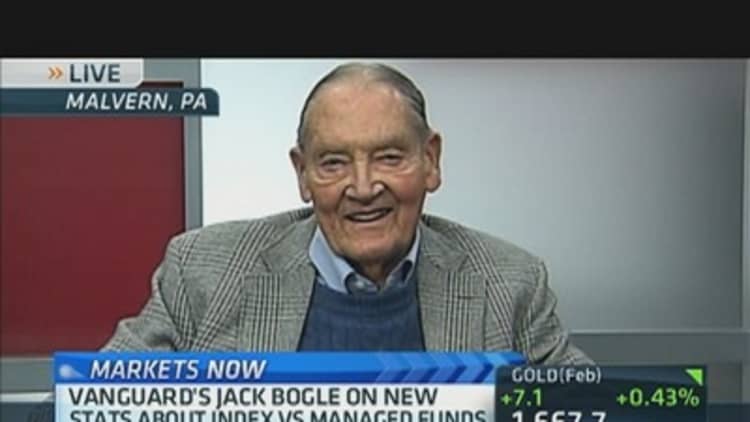Matt Ygelsias at Slate's MoneyBox argues that the "clear implication" of the efficient market hypothesis is that there is a "strong case for paternalistic regulation" in financial services.
Ygelsias doesn't go into detail about what the paternalistic regulation would be or how it would work. But I get the sense that he is trying to make the case that regulation should nudge investors into low-cost, diversified index funds.
The logic here is pretty straight-forward. The efficient markets hypothesis holds that market prices accurately reflect all available information. One implication of this is that it's extremely unlikely that investors can beat the market by picking stocks.
In fact, picking stocks or hiring professional money managers is likely to be a losing strategy for most investors. So shouldn't regulation discourage this sort of thing?

Here's the problem with this sort of thinking:
In the first place, the efficient market hypothesis is just a hypothesis, an economic model of how the world works. What's more it's a model whose functioning depends on another hypothetical concept—that markets tend toward equilibrium.
(Read more: The emerging marketwith big returns)
But the market equilibrium hypothesis itself depends on the efficient market hypothesis to be true. Do we really want government regulation pushing people to invest based on a circular joint-hypothesis?
Even economist Eugene Fama says that the efficient market hypothesis is not strictly true.
"I start my class every year by saying, 'These are models. And the reason we call them models is that they're not 100 percent true. If they were, we would call them reality, not models. They're simplifications,'" Fama said in a 2007 interview with the Minneapolis Fed.
More importantly, the efficient markets hypothesis depends on investors quickly changing their views based on new information. One of the critiques that behavioral economics offers of the idea is that this isn't always true: Sometimes people react slowly to new information, or misread it or ignore it due to cognitive biases.
(Read more: 2 years, nocorrection, and what's bad about that)
Loading the dice in favor of indexing would build into the market a bias away from reacting to market news. Whatever mechanism was used to nudge investors toward indexing would make reacting to new information a costly endeavor for investors. The market would less efficiently price in new information.
This would, of course, create new opportunities for sophisticated investors willing to bear the costs of overcoming regulatory penalties for stock-picking to beat the market.
If there are enough arbitrageurs around, they might even be able to restore equilibrium and efficiency. But there's no guarantee that there will be enough capital dedicated to arbitrage once the government has begun pushing folks out of stock picking.
And, of course, there's the potential for creating even more inequality: Wealthy investors not subject to the paternalistic rules against stock picking get the opportunity to get rich betting on mispricing caused by the inefficiency introduced by regulation, while everyone else gets stuck in the index funds.
Note that this doesn't mean that pretty much everyone shouldn't be in index funds.
Both the behavioral economics people and the efficient markets people preach the value of index funds. The nightmare scenario of everyone being in an index fund—and therefore the market becoming wildly inefficient—isn't really a nightmare at all, so long as the cost of getting out of index investing isn't too high.
(Read more: ETF investors aremaking a hugely bullish bet)
Imagine a world where everyone is an indexer on day one. Then two things happen on day two.
A giant oil company's deep sea oil well explodes and contaminates the Gulf of Mexico; and a technology company introduces a new kind of phone that everyone in the world wants. If everyone remains an indexer, we have a problem.
The market prices will not reflect the oil companies coming losses or the tech companies coming gains. But so long as investors can get out of the index funds, they'll be able to trade the market back to an efficient price.
In other words, it's a very bad idea to paternalistically bias the market in favor of investing according to the efficient market hypothesis. Perversely, you wind up making the market less efficient.
—By CNBC's John Carney. Follow him on Twitter @Carney






